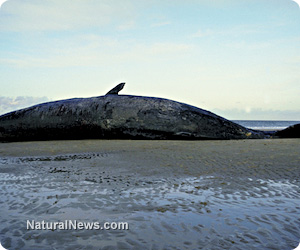
Japan ordered to halt 'scientific' whale slaughter
Thursday, April 17, 2014 by: J. D. Heyes
Tags: whaling, Japan, scientific slaughter
- Newly released JFK files reveal Pentagon's role in creating Lyme disease and covid in the same lab
- BIGGEST SCAM: You pay income tax, then taxes on purchases, then personal property tax on what you own that you already paid taxes on with taxed money
- Analysis: The coming economic collapse, a mass uprising and Trump's three secret weapons to halt the growing revolt
- American food is the MOST TOXIC “FOOD” on earth
- EXPOSED: Antifa and IRS collude to shield radical funding from taxation
- The flu vaccine paradox: Are we making things worse?
- A lack of integrity in Academia: Harvard professor found GUILTY of fraudulent research to promote CRT theory
- Big Pharma's $8 Billion bribery scheme exposed: how doctors are pushed to prescribe junk science, not heal
- Heads up! List of food shortages expected in 2025 as the campaign of forced starvation continues to be waged against the American people
- Reclaim your health: How midlife exercise reverses years of inactivity
- Trump reverses course on Gaza plan, says “nobody is expelling Palestinians”
- Florida takes a stand: DeSantis proposes permanent ban on mRNA vaccine mandates
- Beyond consequence
- 5 Simple steps to boost your brainpower: How to strengthen executive function in a distracted world
- Mike Adams Sermon 66: God will DESTROY ISRAEL for its wickedness
- OpenAI whistleblower who dissented against how the company trained ChatGPT found dead
- Elon Musk: Aliens could be here on Earth RIGHT NOW
- Boys are back in town: Trump’s patriotic alpha crew takes the wheel while toxic females ride in the backseat
- Reclaim your health: How midlife exercise reverses years of inactivity
- A lack of integrity in Academia: Harvard professor found GUILTY of fraudulent research to promote CRT theory
- Space war brewing? Russia threatens to destroy Starlink satellites
- EPA advisor admits the agency is funneling billions to climate groups ahead of Trump’s return to White House
- Elon Musk: Aliens could be here on Earth RIGHT NOW
- Big Pharma's $8 Billion bribery scheme exposed: how doctors are pushed to prescribe junk science, not heal
- Historian warns Israel may be entering an “IRREMEDIABLE DECLINE”
- Trump reverses course on Gaza plan, says “nobody is expelling Palestinians”
- Mike Adams Sermon 66: God will DESTROY ISRAEL for its wickedness
- Rep. Nancy Mace introduces bill to ban biological males from female facilities on federal property
- New York politicians push bill allowing governor to indefinitely detain the unvaccinated on a whim
- RFK Jr.'s SSRI antidepressant investigation sparks liberal meltdown, exposes Big Pharma's dangerous game
- 5 Simple steps to boost your brainpower: How to strengthen executive function in a distracted world
- Mark Zuckerberg's REAL NAME is Jacob Greenberg and he is the GRANDSON of DAVID ROCKEFELLER, hence the POWER of FAKEBOOK
- Survival 101: Effective EMF blocking techniques
- Sales of survival bunkers rise following Russia’s use of the Oreshnik hypersonic ballistic missile
- Trump Administration cuts 2,000 USAID jobs, places most employees on leave in sweeping reform effort
- Pilots report mysterious lights 'moving at extreme speeds' across Oregon skies
- EPA advisor admits the agency is funneling billions to climate groups ahead of Trump’s return to White House
- The Health Ranger releases “Vaccine Zombie” song and music video, using AI-animated zombies for the music video
- The pandemic as a tool for INDOCTRINATION: Understanding “The Indoctrinated Brain” by Dr. Michael Nehls
- California's social media censorship law struck down: A victory for free speech or a threat to online safety?
- Mike Adams releases new song and music video: Nothing More Disgusting Than a Globalist
- Congratulations to the FULLY UNVACCINATED as you resisted the COVID-19 PROPAGANDA MACHINE fueled by over $100 BILLION
- Mike Adams releases country western hit single: Goin’ Back in Time is Comin’ Home
- Dr. Mike Yeadon releases 15-minute testimony - WATCH - about genocidal intent of COVID “vaccines”
- RFK Jr. clears key hurdle: Sen. Susan Collins backs controversial HHS nominee, signaling a new era for health policy
- Mike Adams releases music poetry sensation: A Child of God
- Unpacking the Lies That We’ve Been Fed – new song and music video released by Mike Adams, the Health Ranger
- Trump administration takes on global censorship: A new frontier for free speech advocacy
- Ex-FBI Chief EXPOSES disgraceful government coverups of Oklahoma City Bombing, Kennedy assassinations, 9/11 WTC, and "Terrorism" as plot to destroy Constitution
- Federal judge backs Trump's mass firings, clearing path for government downsizing
- Florida takes a stand: DeSantis proposes permanent ban on mRNA vaccine mandates
- Michigan sheriff announces criminal investigation into 2020 election crimes, Dominion Voting Systems
- “Why we influenced the 2020 elections”: Facebook files reveal the coordinated effort to bury the Hunter Biden laptop story
- Bush tomato: A mighty superfood that supports digestive health
- Red Cross issues warning to stop blood plasma donations from vaccinated people
- Scientists confirm: GENIUS brain function can be spontaneously unleashed in humans without any apparent cause
- EPA advisor admits the agency is funneling billions to climate groups ahead of Trump’s return to White House
- HYSSOP: What research reveals about the health benefits of this ancient holy herb
- Two containers with completed ballots fall out of truck in Florida
- Fully vaccinated about to see “tsunami” of illness and death, warns virologist
- Today I asked our AI language model “Neo” about which phytonutrients or phytochemicals can block the spike protein related to SARS-CoV-2 … Here is what it answered…
- Global leaders unite to clamp down on “misinformation” with UN-backed Cascais Declaration
- BREAKING: 2025 NDAA authorizes mandatory military draft of WOMEN across America… as Pentagon pursues global NUCLEAR war with both Russia and China at the same time
- Michael Yon warns of a ZIONIST TAKEOVER in Trump’s second administration
- BOMBSHELL: DNA testing kits are a SCAM to develop ethnic-specific bioweapons
- Ozempic and Wegovy weight loss drugs are injectable LIZARD VENOM PEPTIDES that may unleash a devastating wave of organ failure… side effects align with symptoms of SNAKE BITES
- Israeli soldiers accused of even more torture and abuse in the West Bank
- These 13 countries just signed an agreement to engineer a global FAMINE by destroying food supply
- NASA admits that climate change occurs because of changes in Earth’s solar orbit, and NOT because of SUVs and fossil fuels
- RFK Jr. clears key hurdle: Sen. Susan Collins backs controversial HHS nominee, signaling a new era for health policy
- Sermon 30: How Jesus reveals Caesar’s FAKE CURRENCY and FALSE AUTHORITY
- Coriander seeds: Ancient medicine backed by modern science
The government of Australia had filed suit against Japan in the UN's highest court for resolving such disputes between nations in a bid to end whaling in the ice-chilled Southern Ocean, the Canadian Broadcasting Company (CBC) reported.
In reading the court's 12-4 decision, Presiding Judge Peter Tomka declared that the Japanese program failed to justify the large number of minke whales supposedly needed to capture under its current Antarctic program -- 850 annually -- and that the program did not capture that number anyway.
Also, Tomka stated that the program did not come close, either, to capturing the 50 fin and 50 humpback whales it sought to capture.
Cumulatively, he said, the evidence indicated that Japan's claim that it is whaling for scientific purposes was in doubt.
"The court concludes that the special permits granted by Japan for the killing, taking, and treating of whales... are not 'for purposes of scientific research'," Tomka said.
'We will abide by the ruling'
The UN court ordered Japan to stop all issuing of whaling permits at least until the program has been completely revamped.
Japanese officials expressed regret over the ruling, with Foreign Ministry spokesman Noriyuki Shikata telling reporters that Tokyo "is deeply disappointed" by the decision.
Nevertheless, "as a state that respects the rule of law... and as a responsible member of the global community, Japan will abide by the ruling of the court," he said.
Peter Garrett, Australia's former environmental minister, who helped file the suit four years ago, said the ruling vindicates his concerns about the Japanese program.
"I'm absolutely over the moon, for all those people who wanted to see the charade of scientific whaling cease once and for all," Garrett told Australian Broadcasting Corp. radio. "I think [this] means without any shadow of a doubt that we won't see the taking of whales in the Southern Ocean in the name of science."
Despite the decision being a major victory for Canberra and environmental groups opposed to whaling, the ruling does not mean that whaling will end.
As reported by the CBC:
Japan has a second, smaller scientific program in the northern Pacific -- which now may also be subject to challenge. Meanwhile Norway and Iceland reject outright a 1986 moratorium on commercial whaling imposed by the International Whaling Commission.
Nevertheless, environmental groups rejoiced.
Pete Bethune, a New Zealand activist who has clashed often with Japanese whalers in an attempt to stop them from hunting, said "justice was served" by the ruling.
Better-designed, truly scientific program would be allowable
"The court dissected their scientific program, pulled it to bits and it proved that the amount of science is tiny relative to the commercial aspects," he said.
Bethune added that, if the Japanese government had prevailed, it would most likely have led to additional countries launching whaling efforts in the Antarctic and, eventually, a full-scale Japanese commercial whaling effort.
Japanese officials argued that Australia was imposing its cultural norms on the Asian economic giant, akin to Hindus demanding that there be an international ban on the killing of cattle.
Despite the fact that whale meat consumption has declined in Japan in recent years, the CBC said it remains a delicacy for some people. Most whale meat from Japanese hunts wind up being sold, though the UN court did not find that that in and of itself makes the program commercial and not scientific.
However, the ruling did specifically state that killing whales for scientific purposes would be legal under international law if studies were designed better. As for Japan, its program was supposed to be able to determine whether commercial whaling in some species can resume without bringing them in danger of becoming extinct.
Sources:
http://www.cbc.ca
http://www.news.com.au
http://www.nzherald.co.nz
Whaling at FETCH.news
Get independent news alerts on natural cures, food lab tests, cannabis medicine, science, robotics, drones, privacy and more.
Take Action: Support Natural News by linking to this article from your website
Permalink to this article:
Embed article link: (copy HTML code below):
Reprinting this article:
Non-commercial use OK, cite NaturalNews.com with clickable link.
Follow Natural News on Facebook, Twitter, Google Plus, and Pinterest
Science News & Studies
Medicine News and Information
Food News & Studies
Health News & Studies
Herbs News & Information
Pollution News & Studies
Cancer News & Studies
Climate News & Studies
Survival News & Information
Gear News & Information
News covering technology, stocks, hackers, and more



"Big Tech and mainstream media are constantly trying to silence the independent voices that dare to bring you the truth about toxic food ingredients, dangerous medications and the failed, fraudulent science of the profit-driven medical establishment.
Email is one of the best ways to make sure you stay informed, without the censorship of the tech giants (Google, Apple, Facebook, Twitter, YouTube, etc.). Stay informed and you'll even likely learn information that may help save your own life."
–The Health Ranger, Mike Adams













































